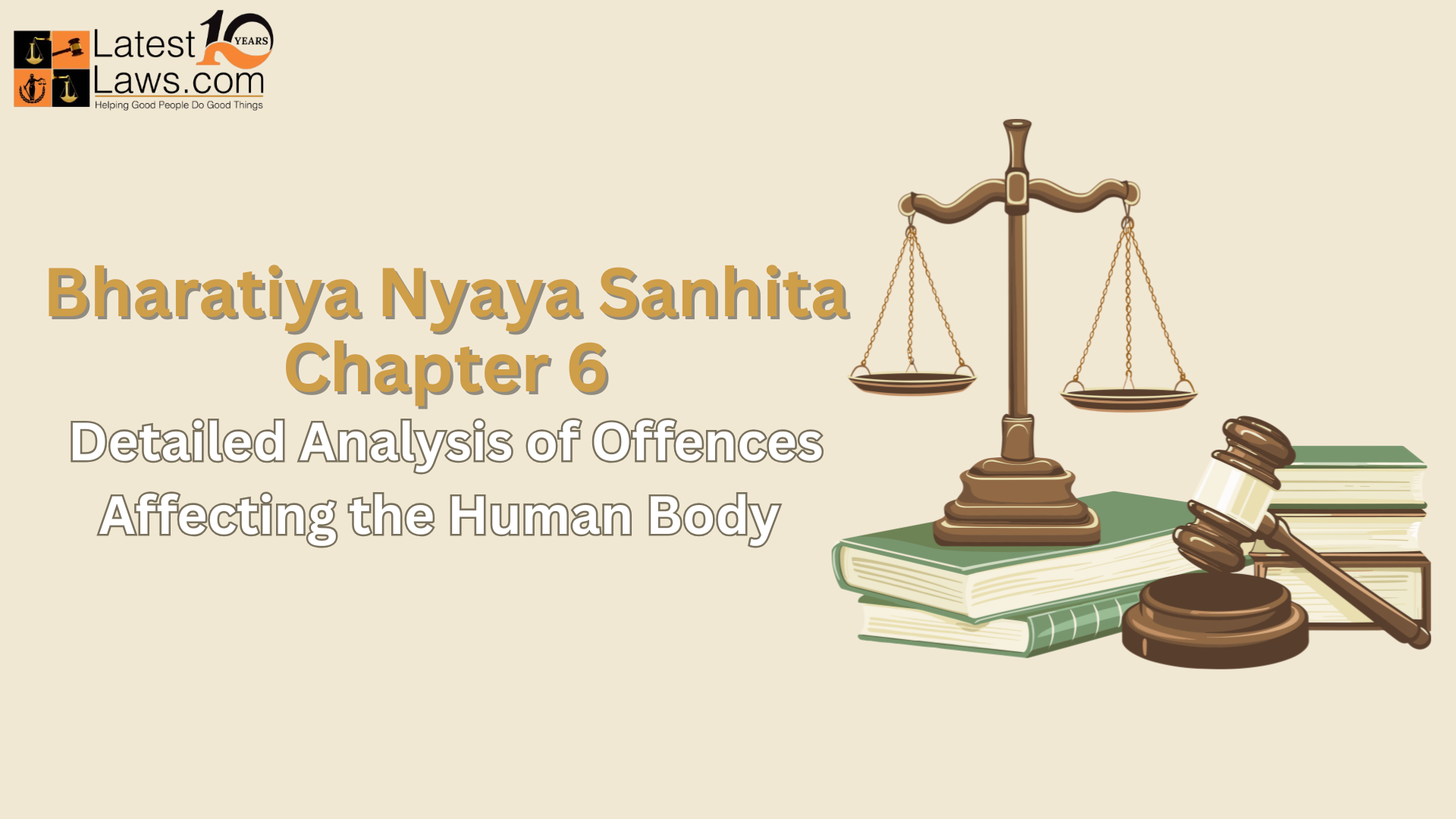BNS Chapter 6: Detailed Analysis of Offences Affecting the Human Body under Bharatiya Nyaya Sanhita, 2023

Introduction
The Bharatiya Nyaya Sanhita (BNS), 2023, is a comprehensive legislative reform replacing the colonial-era Indian Penal Code (IPC) of 1860. Among its critical components, Chapter 6 of BNS is a focal point that consolidates and clarifies offences affecting the human body. These include serious crimes such as murder, hurt, culpable homicide, causing miscarriage, and death by negligence, among others.
This pillar article provides a detailed explanation of Chapter 6 of the BNS, outlines legal provisions, highlights changes from the IPC, and evaluates their significance for law enforcement, the judiciary, and citizens.
What is BNS Chapter 6?
The Scope of Chapter 6 – Protecting Bodily Integrity
BNS Chapter 6 comprises laws that deal with acts causing physical harm or threatening the life and bodily safety of individuals. These laws range from minor injury to intentional killing, and every such offence carries specific definitions, elements of crime, and punishments.
Sections Covered in Chapter 6 of BNS
BNS Chapter 6 includes the following major sections:
-
Section 101 to Section 124
-
Covers: Culpable homicide, murder, hurt, grievous hurt, wrongful restraint, wrongful confinement, dowry death, causing miscarriage, death by rash or negligent act, and more.
Key Offences under Chapter 6 of Bharatiya Nyaya Sanhita
Section 101 – Culpable Homicide
This section defines culpable homicide as causing death with the intention of causing death or bodily injury likely to cause death. It is a broader term than murder and includes situations where death is caused without clear premeditation.
-
Punishment: Life imprisonment or rigorous imprisonment up to 10 years with fine.
Section 102 – Murder
Murder is defined as a form of culpable homicide where intent and premeditation are evident.
-
Punishment: Death penalty or life imprisonment with fine.
-
Change from IPC: Clearer demarcation between culpable homicide and murder to reduce ambiguity in legal proceedings.
Section 108 – Hurt and Grievous Hurt
‘Hurt’ refers to causing bodily pain or injury, while ‘grievous hurt’ includes severe injuries like permanent disability or loss of limb or sight.
-
Examples of grievous hurt: Fracture, disfigurement, or long-term medical impairment.
-
Punishment: Varies from 1 year to 7 years imprisonment with fine.
Section 111 – Causing Miscarriage Without Woman’s Consent
BNS criminalizes non-consensual miscarriage and distinguishes it from lawful abortions.
-
Punishment: Imprisonment up to 10 years and fine.
Section 113 – Dowry Death
This provision targets death of a woman due to harassment related to dowry demands within 7 years of marriage.
-
Presumption of guilt: If shown that cruelty or harassment preceded the death.
-
Punishment: Imprisonment of not less than 7 years and up to life imprisonment.
Section 114 – Death by Negligence
Aimed at professionals like doctors or drivers whose negligent acts result in death.
-
Punishment: Imprisonment up to 5 years and fine, with enhanced penalties for repeat offenders or gross negligence.
Major Legal Changes from IPC to BNS in Chapter 6
More Clarity and Definitions
Unlike IPC, the BNS offers structured definitions for terms like "intention," "negligence," and "consent." This helps eliminate ambiguity during prosecution.
Gender-Neutral Language
Most offences under BNS Chapter 6 are written in gender-neutral terms, making them more inclusive while ensuring the same protection regardless of gender.
Addition of Provisions on Dowry Death and Medical Negligence
BNS now includes specific clauses for dowry-related deaths and medical malpractice, which were previously dispersed or vaguely defined.
Fast-Track Procedures
Chapter 6 encourages faster prosecution timelines for offences like acid attacks, rape, and custodial violence.
Why Chapter 6 is Crucial in Modern Indian Criminal Law
-
Replaces outdated colonial provisions with modern interpretations.
-
Clearly separates murder from culpable homicide, reducing misuse.
-
Expands protection against violence to minors and vulnerable individuals.
-
Acknowledges modern crimes such as medical negligence and custodial abuse.
-
Empowers victims with stronger penalties and victim-centric approaches.
References
-
Ministry of Home Affairs: Bharatiya Nyaya Sanhita, 2023 Official Gazette
-
PRS Legislative Research: Bill Summary of BNS
-
Bar & Bench Article: Analysis of India's Criminal Law Reform
FAQs on BNS Chapter 6
Q1: What is the difference between murder and culpable homicide under BNS?
Under BNS, culpable homicide refers to causing death with intent but without full premeditation. Murder, on the other hand, involves deliberate and planned killing.
Q2: What are the punishments for grievous hurt under BNS Chapter 6?
Depending on the injury's severity, punishments range from 3 years to 10 years imprisonment, especially when grievous hurt involves acid attacks or dangerous weapons.
Q3: Are dowry deaths covered under Chapter 6?
Yes, Section 113 of Chapter 6 explicitly covers dowry deaths, presuming the husband and his family’s involvement if the woman dies within 7 years of marriage.
Q4: How has BNS improved over IPC for bodily offences?
BNS simplifies and modernizes the law, includes gender-neutral terms, and introduces specific clauses on negligence, medical errors, and systematic abuse.
Q5: What is the punishment for causing miscarriage without consent?
Under Section 111, it carries up to 10 years of imprisonment and a fine, distinguishing it from medically approved procedures.
Conclusion
Chapter 6 of the Bharatiya Nyaya Sanhita, 2023, is a landmark development in India’s legal system. It reflects a progressive step toward protecting human dignity, ensuring justice for victims, and streamlining criminal proceedings. Whether you're a law student, practitioner, or an informed citizen, understanding this chapter is essential to grasp India’s evolving legal landscape.
Let this guide serve as your reference to navigating the offences affecting the human body under BNS—a foundational element of the new criminal law era.
- Art
- Causes
- Crafts
- Dance
- Drinks
- Film
- Fitness
- Food
- Games
- Gardening
- Health
- Home
- Literature
- Music
- Networking
- Other
- Party
- Religion
- Shopping
- Sports
- Theater
- Wellness


